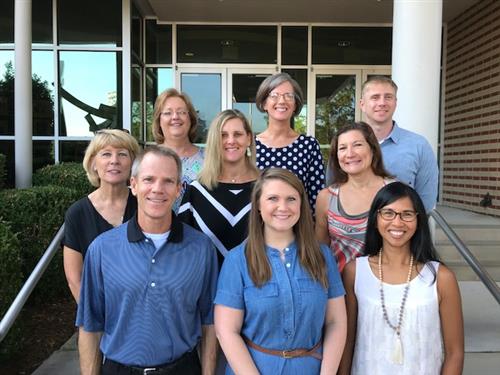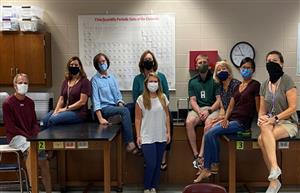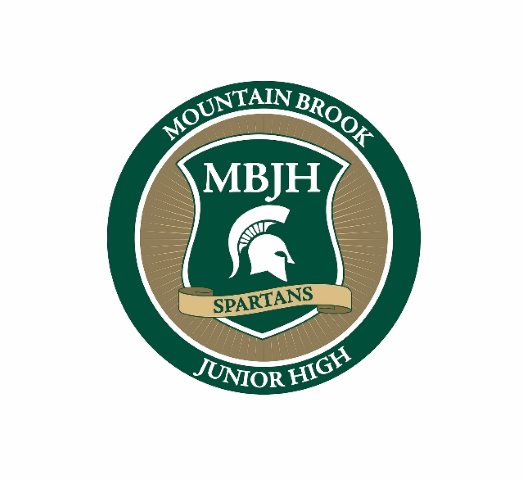-

Bruce Henricks, Blakeley Whitney, Mariya Breaux, Debbie Stump, Vicki Webb, Marisa Burns, Susan Haggard,
Pearle Smith, and Danny Sipes
 MBJH Science Department7th GRADE LIFE SCIENCE
MBJH Science Department7th GRADE LIFE SCIENCEThis course focuses on life science. Students are encouraged to develop an appreciation of the importance of diversity of life, while simultaneously understanding the impact of their roles as individuals in the community of life. Some areas of study include the characteristics of living things, functions of organelles, tissues and organs of various systems in the body, function of chromosomes, and Mendel’s laws of genetics. The focus of this course prepares students for biology and other life science courses taken in high school. Students are involved in laboratory experiments for a deeper understanding of the concepts.
8th Grade PHYSICAL SCIENCE
This course focuses on physical science. The scientific process is used throughout the year with students developing laboratory skills and techniques through discovery-oriented experiments. The curriculum includes the study of atoms and bonding, chemical reactions, Newton’s laws of motion, potential and kinetic energy, and mechanical and electromagnetic waves. The focus of this course is designed to prepare students for the physics and chemistry courses taken in high school.9th Grade BIOLOGY
This is a high school level course taken by the majority of freshmen. The curriculum includes study of the following concepts: basic biochemistry, cytology, genetics, and a survey of the six kingdoms of living things. Students develop laboratory skills and techniques through discovery-oriented experiments.BIOLOGY-ADVANCED
This is an advanced high school course for freshmen. The following minimum requirements are considered for placement: 90 average in the first semester of 8th grade science and teacher recommendation. The curriculum includes study of the following concepts: basic biochemistry, cytology, genetics, and a survey of the six kingdoms of living things. Students develop laboratory skills and techniques through discovery-oriented experiments. The course content is similar to that of regular biology, but moves at an accelerated pace for a more in-depth study of the concepts. Students need to be able to use creativity, inductive and deductive reasoning skills, and intellectual maturity to solve problems.
Menu
Mountain Brook
Junior High
"Providing an effective, challenging, and engaging education for every one of our students"
- Home
- About Us
-
Academics
- "
-
Athletics
-
Clubs & Activities
- "
- 3D Printing Club
- Art Club
- Biking Club
- Calligraphy Club
- Circle of Friends Club
- Disney Club
- DIY Club
- Euchre Club
- Greater Birmingham Humane Society Support Club
- Hand in Paw Club
- Magic Moments
- MBJH TED-Ed Club
- National Beta Club
- NCAA Wrestling Club
- Peer Helpers
- Robotics
- S.O.S.
- Scholar's Bowl
- Sign Language Club
- Spartan Council
- Teacher Aide Club
- Technology Student Association (TSA) Club
- TEDxYouth@MBJH
- Tennis Club
- Walk It Out Club
- Web Leaders
- Yearbook
- Harry Potter Club
- Improv Club
- Key Club
- Spartan Post Online
-
Counseling & Guidance
- "
- Community
-
Departments
- "
- Administration
- Art
- Band
- Broadcast/Film Production
- Career Prep
- Career Tech (Project Lead The Way - PLTW)
- Choir
- Counseling & Guidance
- Drama
- Electives
- English
- Math
- Physical Education
- Professional Learning
- School Nurse
- Science
- Social Studies
- Special Education
- Technology
- World Language
- MBJH Library
- Journalism/Yearbook
- Library
- Resources
-
Directory
- "
- Adams, Kate
- Aldridge, Caitlin
- Argo, Jenny
- Bernd, Drew
- Berridge, Lindsay
- Boozer, Jordan
- Breaux, Mariya
- Brown, Virginia
- Burns, Marisa
- Capocci, Courtney
- Carlson, Leslie
- Carlton, Madeline
- Casey, Carrie
- Centeno, Laura
- Cotten, Andrew
- Crocker, Eddie
- Porter, Connie
- Carey, Betsie
- Eustace, Emily
- Fernandez-Lee, Nidia
- Fils, Blair
- Finch, Anne Carter
- Fischer, Sarah
- Flowers, Sharon
- French, Kate
- Frier, Marjee
- Garrett, Julie
- Gibbons, Brook
- Good, Lucy
- Goodson, Anna Beth
- Gordon, Marrow
- Gunter, Madison
- Haggard, Susan
- Stanford, Karla
- Hartley, Amy
- Haynes, Melanie
- Henegar, Brittany
- Hnizdil, Paul
- Howard, Matt
- Hubbard, Trip
- Jelks, Craig
- Johnsey, Anna
- Johnson, Adam
- Jones, Derek
- Jordan, Janice
- Keller, Betsy
- Kennedy, Derek
- Knox, Angela
- Lambert, William
- Lancaster, Casey
- Laswell, Cathy
- Lewis, Lisa
- Lippeatt, Beth
- Martin, Sara
- Mazanowski, Kimberly
- McCain, Anna
- McDaniel, Alex
- McGowan, Jimmy
- Moran, Sean
- Musso, Kristin
- Nation, Rachel Forsyth
- Olson, Lisa
- Patterson, Leigh Ann
- Pell, Buddy
- Phillips, Heather
- Phillips, John
- Pledger, John
- Posey, Micheal
- Proctor, Rachel
- Rector, Anne
- Robinson, Morganne
- Haymon, Sarah
- Rooks, Anna
- Sager, Anna
- Whitehead, Sherri
- Sipes, Daniel
- Smith, Michelle
- Smith, Pearle
- Speegle, Cara
- Strickland, Helena
- Stump, Debbie
- Thomas, Katie
- Thornton, Jane
- Thrasher, Melissa
- Tuck, Melissa
- Walton, Kristin
- Watkins, Sophie
- Watson, Jennifer
- Webb, Vicki
- Welo, Rebecca
- Whitney, Blakeley
- Wilder, Kimberly
- Jankowski, Katherine
- Wood Weas, Liz
- Conboy, Sean
- Wiggins Jill
- Day, Dustin
- Genry, Tami
- Hagen, Ryan
- Hayslip, Katie
- Henricks, Bruce
- Martin, Holly
- MBJH TEACHER
- McMichen, Breanna
- Pounds, Bonnie
- Proctor, Shelly
- Rose, Michelle
- Stephens, Randy
-
Technology Assist
- "
- Calendar
- Home
- Departments
- Science
Science
Page Navigation
Mountain Brook Junior High
205 Overbrook Road
Mountain Brook, Al 35213
Phone | 205-871-3516
Fax | 205-877-8340


